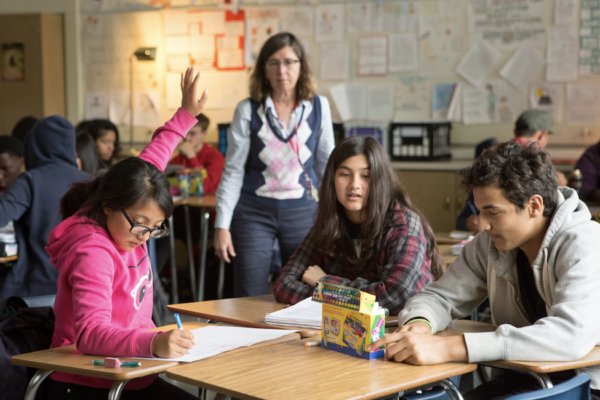Schools across the country have made rapid gains in expanding Advanced Placement courses to traditionally underrepresented groups, particularly African American and Latinx students. But despite the progress in closing the “participation gap,” the share of students of color who pass AP exams at the end of the year lags.
Stanford University researchers are now working with AP teachers to address this performance gap, to change how they communicate their high standards, expectations and assurances to increase the number of students passing the year-end tests.
Advanced Placement classes, administered by the College Board, are designed to provide high school students with a curriculum that approximates the rigor of introductory college courses. Participation can signal preparation for college-level work, and passing the AP exams (with a score of 3 or higher) can also earn high school students college credits.
As such, these demanding courses can be a shock to students who are not used to struggling with schoolwork or facing criticism of their work. And research shows some students of color can interpret negative feedback as a message that a teacher doubts their intelligence, or even as evidence of bias or stereotyping. This is especially true when critical feedback is shared with a student of color by a white teacher.
That can leave the student less likely to approach a teacher with questions and less likely to persist through the inherent challenges of an AP class. To reframe how students understand criticism from their teachers, researchers advocate what they call “wise feedback.”
[Read More: Teacher Mindsets: How Educators’ Perspectives Shape Student Success]
Wise feedback involves educators offering assurance and communicating high expectations ahead of offering criticism. For students of color, such messages as “I have high standards, and I know you can meet them” can motivate them to improve their work, rather than leave them discouraged by student-teacher interactions.
Research reveals that framing feedback in this way is especially important for students of color or any group underrepresented in a classroom or field of study.
In engineering, for example, gender disparity and subtle discouragement often mean that female students question whether they belong in college programs. A recent study of female undergraduate engineering students found that those randomly assigned to a female peer mentor were more likely to stay in engineering programs and have career aspirations in the field. The assignment of a female mentor, it is theorized, was “wise” because it interrupted the cycle in which students were receiving, or interpreting, negative messages about belonging.
Research on teacher feedback has used experiments where written notes, designed to look like they were from a teacher, were added to criticism of student work. A new project by a team of Stanford researchers is investigating how to help teachers offer these kinds of supportive messages through their everyday practices.
The project—a partnership between Stanford University, Equal Opportunity Schools, and the College Board—has an online training module that introduces AP teachers to wise feedback. The module, which also includes a number of exercises requiring teachers to plan how they will communicate high standards and assurances in critiques of student work, is part a study to assess whether training teachers in wise feedback can realize changes in AP test performance, especially among minority test-takers.
The study, conducted during the 2018-19 school year, employed an online professional-development platform maintained by the College Board. More than 1,400 AP teachers—teaching an estimated 17,000 students—participated in the study, either as part of the experimental group (those receiving the “wise feedback” module) or a control group that receives a module containing open-ended questions about delivering feedback to students.
If the study finds that shifting teachers’ perspectives translates into higher AP scores, it will be an important step down the path to improving college readiness for an increasingly diverse student body.
Craig Wacker, a FutureEd senior fellow, is co-author of Teacher Mindsets: How Educators’ Perspectives Shape Student Success.

